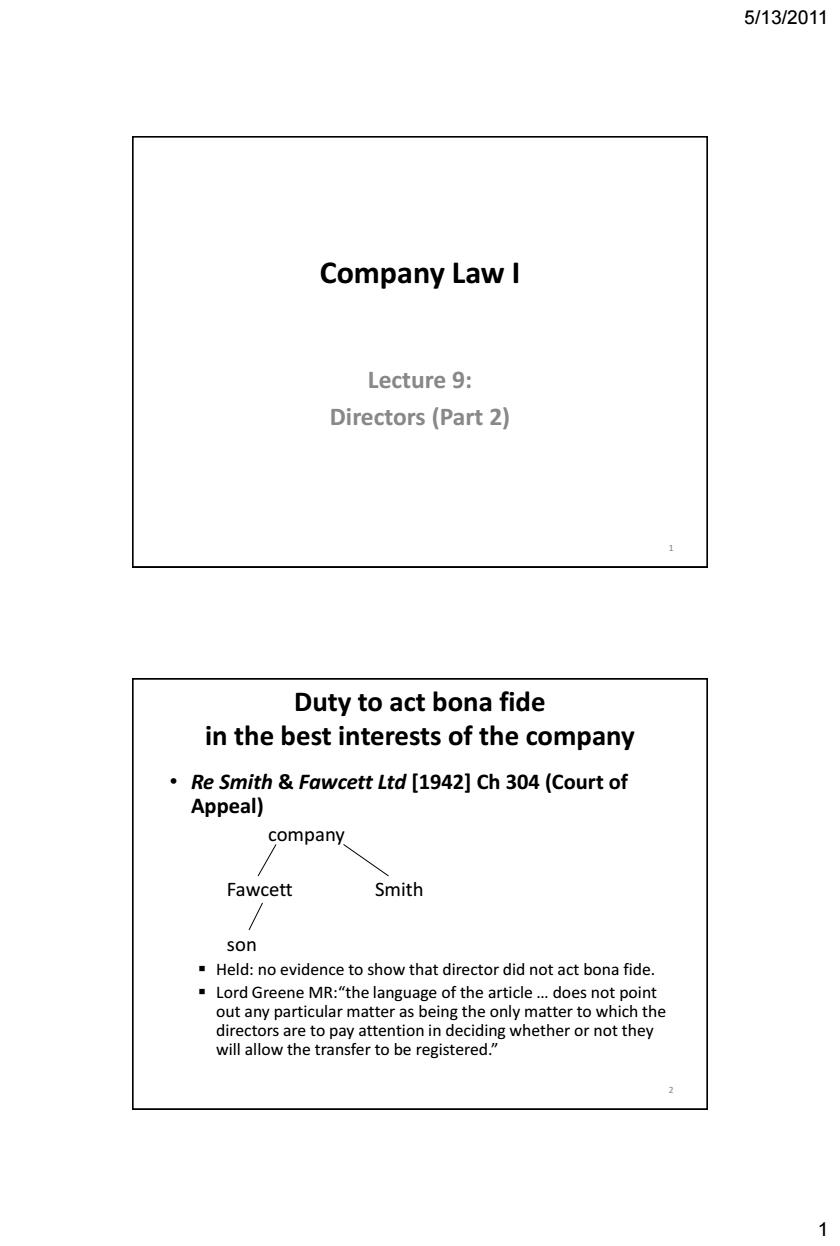
5/13/2011 Company Law I Lecture 9: Directors (Part 2) Duty to act bona fide in the best interests of the company Re Smith Fawcett Ltd [1942]Ch 304 (Court of Appeal) company Fawcett Smith son Held:no evidence to show that director did not act bona fide. Lord Greene MR:"the language of the article...does not point out any particular matter as being the only matter to which the directors are to pay attention in deciding whether or not they will allow the transfer to be registered." 1
5/13/2011 1 1 Company Law I Lecture 9: Directors (Part 2) 2 Duty to act bona fide in the best interests of the company • Re Smith & Fawcett Ltd [1942] Ch 304 (Court of Appeal) company Fawcett Smith son Held: no evidence to show that director did not act bona fide. Lord Greene MR:“the language of the article … does not point out any particular matter as being the only matter to which the directors are to pay attention in deciding whether or not they will allow the transfer to be registered
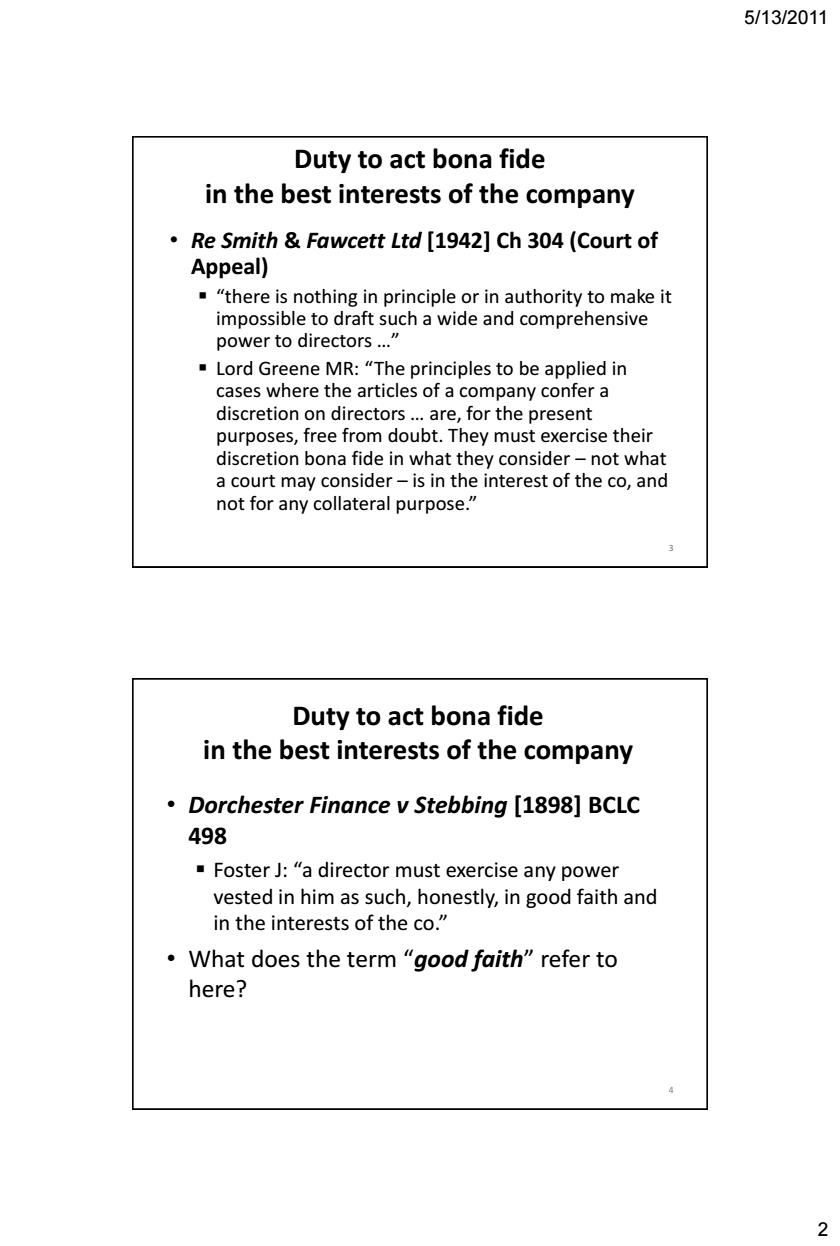
5/13/2011 Duty to act bona fide in the best interests of the company Re Smith Fawcett Ltd [1942]Ch 304 (Court of Appeal) "there is nothing in principle or in authority to make it impossible to draft such a wide and comprehensive power to directors..." Lord Greene MR:"The principles to be applied in cases where the articles of a company confer a discretion on directors...are,for the present purposes,free from doubt.They must exercise their discretion bona fide in what they consider-not what a court may consider-is in the interest of the co,and not for any collateral purpose." Duty to act bona fide in the best interests of the company Dorchester Finance v Stebbing [1898]BCLC 498 Foster J:"a director must exercise any power vested in him as such,honestly,in good faith and in the interests of the co." What does the term"good faith"refer to here? 2
5/13/2011 2 3 Duty to act bona fide in the best interests of the company • Re Smith & Fawcett Ltd [1942] Ch 304 (Court of Appeal) “there is nothing in principle or in authority to make it impossible to draft such a wide and comprehensive power to directors …” Lord Greene MR: “The principles to be applied in cases where the articles of a company confer a discretion on directors … are, for the present purposes, free from doubt. They must exercise their discretion bona fide in what they consider – not what a court may consider – is in the interest of the co, and not for any collateral purpose.” 4 • Dorchester Finance v Stebbing [1898] BCLC 498 Foster J: “a director must exercise any power vested in him as such, honestly, in good faith and in the interests of the co.” • What does the term “good faith” refer to here? Duty to act bona fide in the best interests of the company

5/13/2011 Duty to act bona fide in the best interests of the company Another example:Bishopsgate Investment Management Ltd (in lig)v Maxwell (No 2)[1994]1 All ER 261 Acting contrary to the corporate constitution could also be regarded as being in breach of the duty to act in the interests of the co as the constitution can define and set limits to the co's interest. Duty to act bona fide in the best interests of the company Business judgment rule Delaware courts will apply rationality review to business judgments provided that the directors have complied with their duty of care and their duty of loyalty. English courts do not review business judgments. >Howard Smith v Ampol Petroleum Ltd. >But in Re Walt Disney Derivative Litigation 907 A 2d 693 (Del Ch 2005) 3
5/13/2011 3 5 • Another example: Bishopsgate Investment Management Ltd (in Iiq) v Maxwell (No 2) [1994] 1 All ER 261 Acting contrary to the corporate constitution could also be regarded as being in breach of the duty to act in the interests of the co as the constitution can define and set limits to the co’s interest. Duty to act bona fide in the best interests of the company 6 • Business judgment rule Delaware courts will apply rationality review to business judgments provided that the directors have complied with their duty of care and their duty of loyalty. English courts do not review business judgments. Howard Smith v Ampol Petroleum Ltd. But in Re Walt Disney Derivative Litigation 907 A 2d 693 (Del Ch 2005) Duty to act bona fide in the best interests of the company
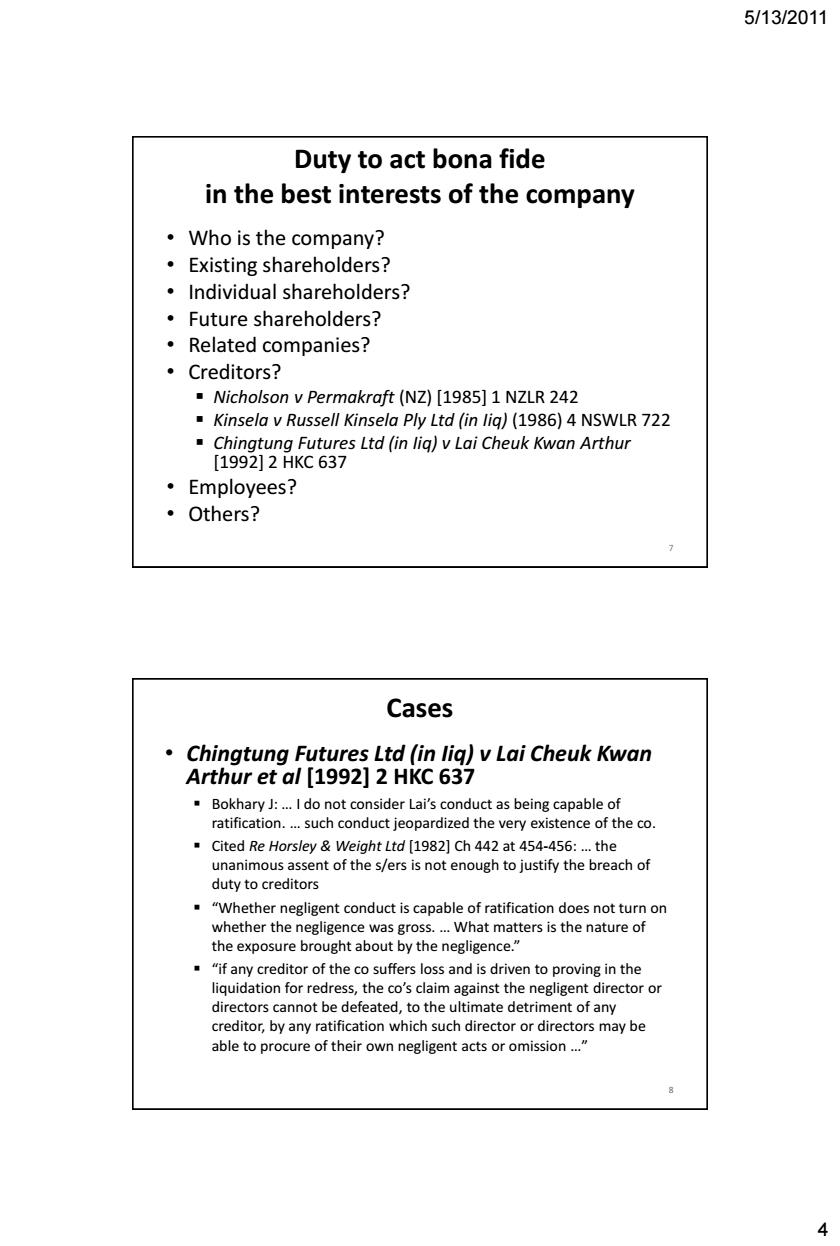
5/13/2011 Duty to act bona fide in the best interests of the company ·Who is the company? Existing shareholders? Individual shareholders? Future shareholders? ·Related companies? ·Creditors? Nicholson v Permakraft (NZ)[1985]1 NZLR 242 Kinsela v Russell Kinsela Ply Ltd (in liq)(1986)4 NSWLR 722 Chingtung Futures Ltd(in liq)v Lai Cheuk Kwan Arthur [1992]2HKC637 ·Employees? Others? Cases Chingtung Futures Ltd(in lig)v Lai Cheuk Kwan Arthur et al [1992]2 HKC 637 Bokhary J:...I do not consider Lai's conduct as being capable of ratification....such conduct jeopardized the very existence of the co. Cited Re Horsley Weight Ltd [1982]Ch 442 at 454-456:...the unanimous assent of the s/ers is not enough to justify the breach of duty to creditors "Whether negligent conduct is capable of ratification does not turn on whether the negligence was gross....What matters is the nature of the exposure brought about by the negligence." "if any creditor of the co suffers loss and is driven to proving in the liquidation for redress,the co's claim against the negligent director or directors cannot be defeated,to the ultimate detriment of any creditor,by any ratification which such director or directors may be able to procure of their own negligent acts or omission..." 4
5/13/2011 4 7 • Who is the company? • Existing shareholders? • Individual shareholders? • Future shareholders? • Related companies? • Creditors? Nicholson v Permakraft (NZ) [1985] 1 NZLR 242 Kinsela v Russell Kinsela Ply Ltd (in Iiq) (1986) 4 NSWLR 722 Chingtung Futures Ltd (in Iiq) v Lai Cheuk Kwan Arthur [1992] 2 HKC 637 • Employees? • Others? Duty to act bona fide in the best interests of the company 8 Cases • Chingtung Futures Ltd (in Iiq) v Lai Cheuk Kwan Arthur et al [1992] 2 HKC 637 Bokhary J: … I do not consider Lai’s conduct as being capable of ratification. … such conduct jeopardized the very existence of the co. Cited Re Horsley & Weight Ltd [1982] Ch 442 at 454-456: … the unanimous assent of the s/ers is not enough to justify the breach of duty to creditors “Whether negligent conduct is capable of ratification does not turn on whether the negligence was gross. … What matters is the nature of the exposure brought about by the negligence.” “if any creditor of the co suffers loss and is driven to proving in the liquidation for redress, the co’s claim against the negligent director or directors cannot be defeated, to the ultimate detriment of any creditor, by any ratification which such director or directors may be able to procure of their own negligent acts or omission …
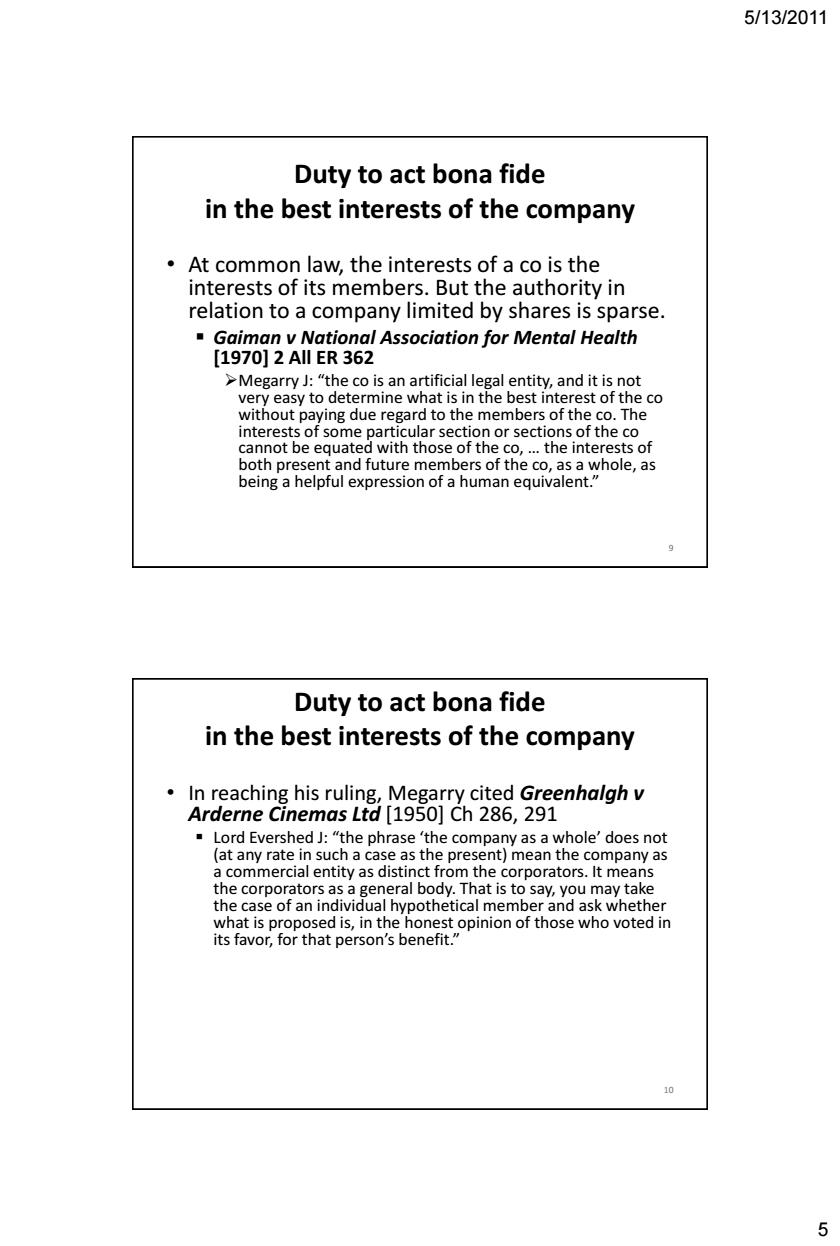
5/13/2011 Duty to act bona fide in the best interests of the company At common law,the interests of a co is the interests of its members.But the authority in relation to a company limited by shares is sparse. Gaiman v National Association for Mental Health [1970]2 AIl ER362 >Megarry J:"the co is an artificial legal entity,and it is not very easy to determine what is in the best interest of the co without paying due regard to the members of the co.The interests of some particular section or sections of the co cannot be equated with those of the co,...the interests of both present and future members of the co,as a whole,as being a helpful expression of a human equivalent." Duty to act bona fide in the best interests of the company In reaching his ruling,Megarry cited Greenhalgh v Arderne Cinemas Ltd [1950]Ch 286,291 Lord Evershed J:"the phrase 'the company as a whole'does not (at any rate in such a case as the present)mean the company as a commercial entity as distinct from the corporators.It means the corporators as a general body.That is to say,you may take the case of an individual hypothetical member and ask whether what is proposed is,in the honest opinion of those who voted in its favor,for that person's benefit." 5
5/13/2011 5 9 • At common law, the interests of a co is the interests of its members. But the authority in relation to a company limited by shares is sparse. Gaiman v National Association for Mental Health [1970] 2 All ER 362 Megarry J: “the co is an artificial legal entity, and it is not very easy to determine what is in the best interest of the co without paying due regard to the members of the co. The interests of some particular section or sections of the co cannot be equated with those of the co, … the interests of both present and future members of the co, as a whole, as being a helpful expression of a human equivalent.” Duty to act bona fide in the best interests of the company 10 • In reaching his ruling, Megarry cited Greenhalgh v Arderne Cinemas Ltd [1950] Ch 286, 291 Lord Evershed J: “the phrase ‘the company as a whole’ does not (at any rate in such a case as the present) mean the company as a commercial entity as distinct from the corporators. It means the corporators as a general body. That is to say, you may take the case of an individual hypothetical member and ask whether what is proposed is, in the honest opinion of those who voted in its favor, for that person’s benefit.” Duty to act bona fide in the best interests of the company
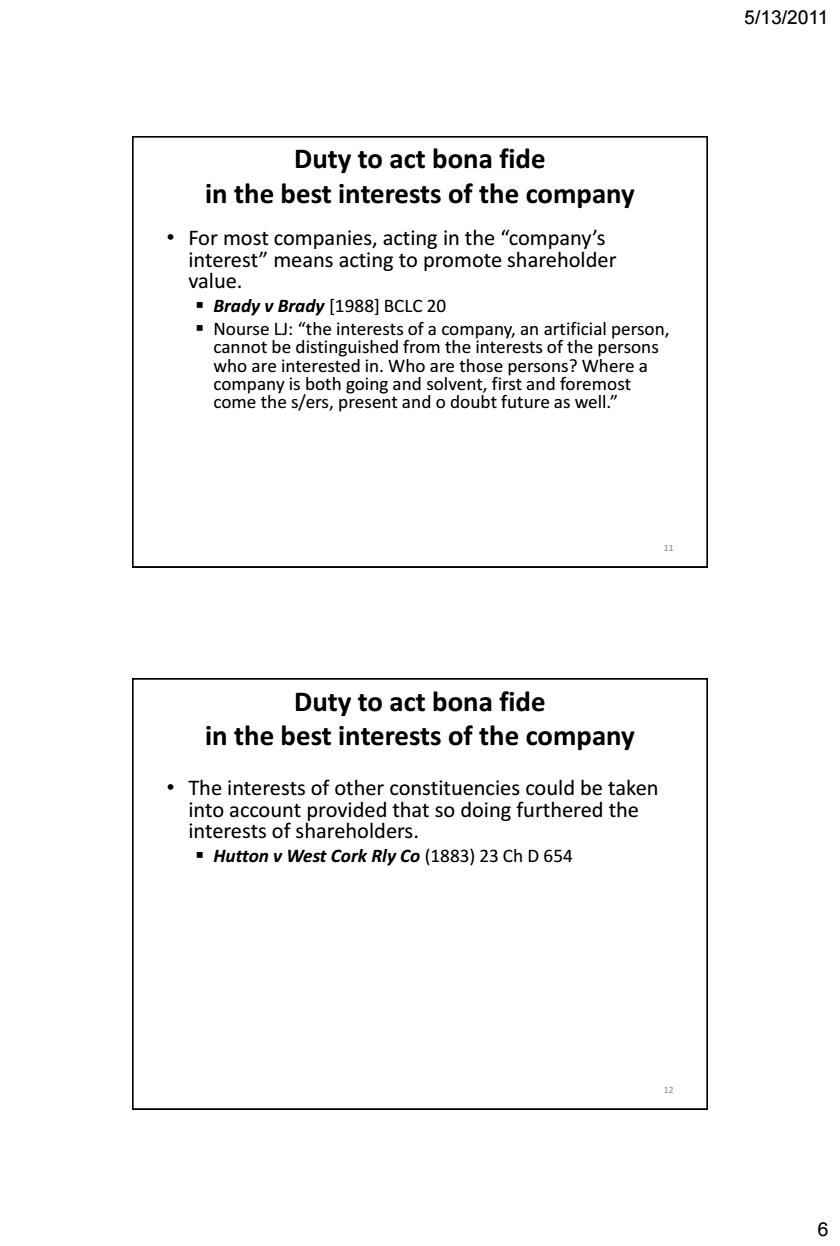
5/13/2011 Duty to act bona fide in the best interests of the company ·For most companies,.acting in the“company's interest"means acting to promote shareholder value. Brady v Brady [1988]BCLC 20 Nourse L:"the interests of a company,an artificial person, cannot be distinguished from the interests of the persons who are interested in.Who are those persons?Where a company is both going and solvent,first and foremost come the s/ers,present and o doubt future as well." 11 Duty to act bona fide in the best interests of the company The interests of other constituencies could be taken into account provided that so doing furthered the interests of shareholders. Hutton v West Cork Rly Co(1883)23 Ch D654 6
5/13/2011 6 11 • For most companies, acting in the “company’s interest” means acting to promote shareholder value. Brady v Brady [1988] BCLC 20 Nourse LJ: “the interests of a company, an artificial person, cannot be distinguished from the interests of the persons who are interested in. Who are those persons? Where a company is both going and solvent, first and foremost come the s/ers, present and o doubt future as well.” Duty to act bona fide in the best interests of the company 12 • The interests of other constituencies could be taken into account provided that so doing furthered the interests of shareholders. Hutton v West Cork Rly Co (1883) 23 Ch D 654 Duty to act bona fide in the best interests of the company

5/13/2011 Duty to act bona fide in the best interests of the company In the interests of members-default rule only In the absence of contrary intention set out in the co's articles,the co's interests the interests of present and future members as a whole Co could elect to define its interests differently in articles: to be run in the interests of other constituencies or a combination of constituencies >Re Horsely Weight Ltd [1982]Ch 442 13 Duty to act bona fide in the best interests of the company What is intended by the reference to future members? Megarry J in Gaiman refers to both existing and future members What's intended to by the reference to future members? Sensible understanding? What if an individual shareholder's interest diverge? Megarry J in Gaiman refers to the members'interests "as a whole" If the interests conflict,the board is entrusted with maximizing overall s/er interests,which may involve balancing and choosing between the different s/er interests 7
5/13/2011 7 13 • In the interests of members - default rule only In the absence of contrary intention set out in the co’s articles, the co’s interests = the interests of present and future members as a whole Co could elect to define its interests differently in articles: to be run in the interests of other constituencies or a combination of constituencies Re Horsely & Weight Ltd [1982] Ch 442 Duty to act bona fide in the best interests of the company 14 • What is intended by the reference to future members? Megarry J in Gaiman refers to both existing and future members What’s intended to by the reference to future members? Sensible understanding? • What if an individual shareholder’s interest diverge? Megarry J in Gaiman refers to the members’ interests “as a whole” If the interests conflict, the board is entrusted with maximizing overall s/er interests, which may involve balancing and choosing between the different s/er interests Duty to act bona fide in the best interests of the company
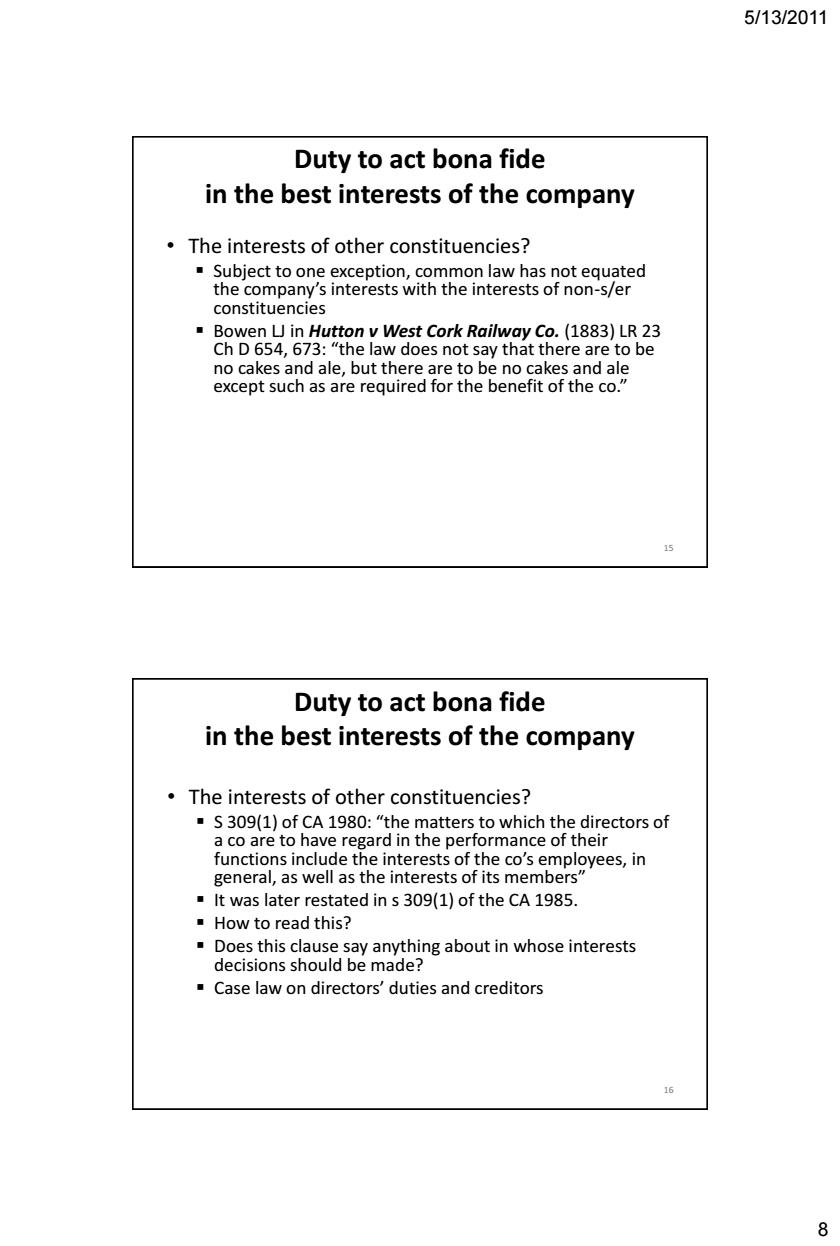
5/13/2011 Duty to act bona fide in the best interests of the company The interests of other constituencies? Subject to one exception,common law has not equated the company's interests with the interests of non-s/er constituencies Bowen L in Hutton v West Cork Railway Co.(1883)LR 23 Ch D 654,673:"the law does not say that there are to be no cakes and ale,but there are to be no cakes and ale except such as are required for the benefit of the co." 15 Duty to act bona fide in the best interests of the company The interests of other constituencies? S 309(1)of CA 1980:"the matters to which the directors of a co are to have regard in the performance of their functions include the interests of the co's employees,in general,as well as the interests of its members" It was later restated in s 309(1)of the CA 1985. How to read this? Does this clause say anything about in whose interests decisions should be made? Case law on directors'duties and creditors 6 8
5/13/2011 8 15 • The interests of other constituencies? Subject to one exception, common law has not equated the company’s interests with the interests of non-s/er constituencies Bowen LJ in Hutton v West Cork Railway Co. (1883) LR 23 Ch D 654, 673: “the law does not say that there are to be no cakes and ale, but there are to be no cakes and ale except such as are required for the benefit of the co.” Duty to act bona fide in the best interests of the company 16 • The interests of other constituencies? S 309(1) of CA 1980: “the matters to which the directors of a co are to have regard in the performance of their functions include the interests of the co’s employees, in general, as well as the interests of its members” It was later restated in s 309(1) of the CA 1985. How to read this? Does this clause say anything about in whose interests decisions should be made? Case law on directors’ duties and creditors Duty to act bona fide in the best interests of the company
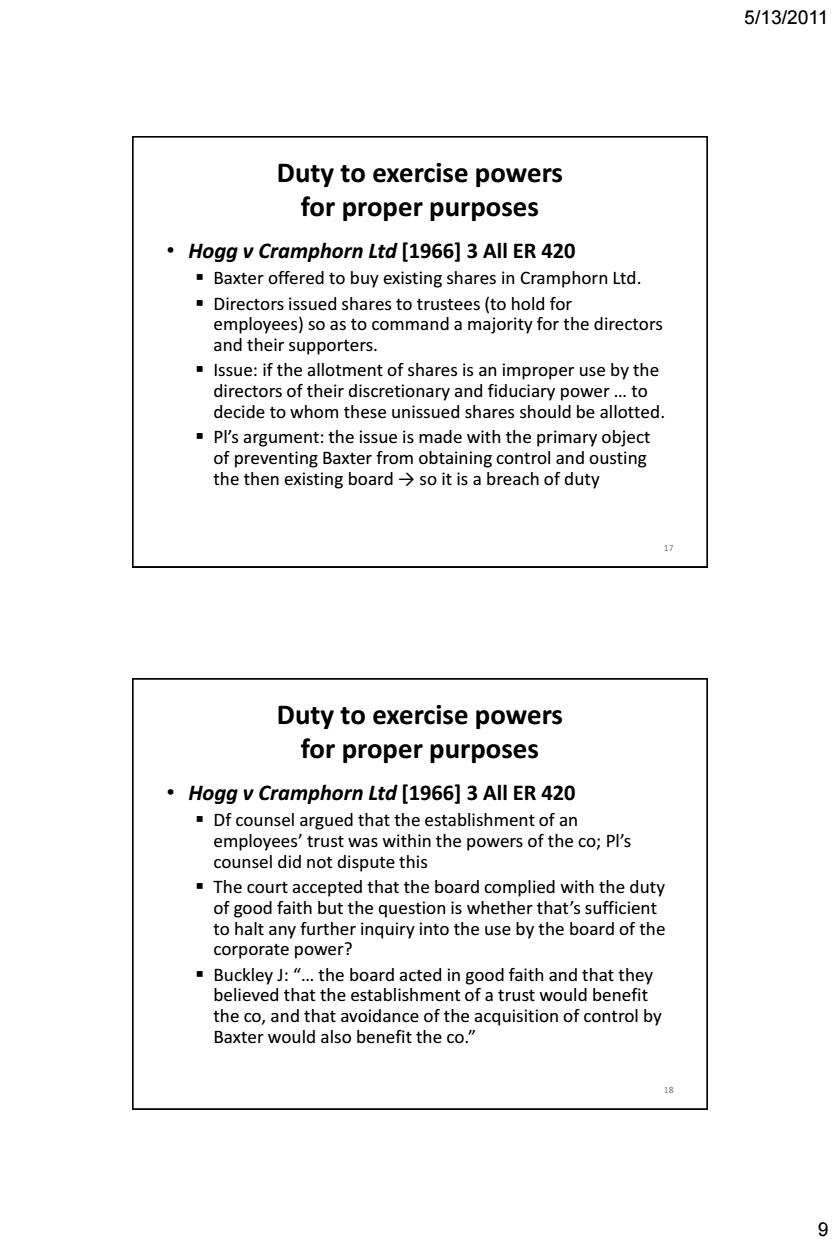
5/13/2011 Duty to exercise powers for proper purposes Hogg v Cramphorn Ltd [1966]3 All ER 420 Baxter offered to buy existing shares in Cramphorn Ltd. Directors issued shares to trustees(to hold for employees)so as to command a majority for the directors and their supporters. Issue:if the allotment of shares is an improper use by the directors of their discretionary and fiduciary power...to decide to whom these unissued shares should be allotted .PI's argument:the issue is made with the primary object of preventing Baxter from obtaining control and ousting the then existing board>so it is a breach of duty 17 Duty to exercise powers for proper purposes .Hogg v Cramphorn Ltd [1966]3 All ER 420 Df counsel argued that the establishment of an employees'trust was within the powers of the co;Pl's counsel did not dispute this The court accepted that the board complied with the duty of good faith but the question is whether that's sufficient to halt any further inquiry into the use by the board of the corporate power? Buckley J:"..the board acted in good faith and that they believed that the establishment of a trust would benefit the co,and that avoidance of the acquisition of control by Baxter would also benefit the co." 9
5/13/2011 9 17 • Hogg v Cramphorn Ltd [1966] 3 All ER 420 Baxter offered to buy existing shares in Cramphorn Ltd. Directors issued shares to trustees (to hold for employees) so as to command a majority for the directors and their supporters. Issue: if the allotment of shares is an improper use by the directors of their discretionary and fiduciary power … to decide to whom these unissued shares should be allotted. Pl’s argument: the issue is made with the primary object of preventing Baxter from obtaining control and ousting the then existing board → so it is a breach of duty Duty to exercise powers for proper purposes 18 • Hogg v Cramphorn Ltd [1966] 3 All ER 420 Df counsel argued that the establishment of an employees’ trust was within the powers of the co; Pl’s counsel did not dispute this The court accepted that the board complied with the duty of good faith but the question is whether that’s sufficient to halt any further inquiry into the use by the board of the corporate power? Buckley J: “… the board acted in good faith and that they believed that the establishment of a trust would benefit the co, and that avoidance of the acquisition of control by Baxter would also benefit the co.” Duty to exercise powers for proper purposes

5/13/2011 Duty to exercise powers for proper purposes Hogg v Cramphorn Ltd [1966]3 All ER 420 Buckley J,following Piercy Mills,focused on the fact that powers were being used to usurp the constitutional settlement of powers in the co between board and s/ers body The directors could not use their powers for the primary purpose of interfering with the exercise by the majority of constitutional rights.' 2 constitutional rights How do we articulate the holding of this case? 19 Duty to avoid conflict of interests Four regulatory strategies: ·Three strands: ·(No-)conflict rule (No-)profit rule Misappropriation rule What if the transaction is fair to the company? Aberdeen Railway Co v Blaikie(1854)Macq HL 461 at 471 Man Luen Corp v Sun King Electronic Printed Circuit Board Factory Ltd [1981]1 HKC 407 Regal (Hastings)Ltd v Gullivers [1942]1 All ER 378 0 10
5/13/2011 10 19 • Hogg v Cramphorn Ltd [1966] 3 All ER 420 Buckley J, following Piercy & Mills, focused on the fact that powers were being used to usurp the constitutional settlement of powers in the co between board and s/ers body The directors could not use their powers for the primary purpose of interfering with ‘the exercise by the majority of constitutional rights.’ 2 constitutional rights How do we articulate the holding of this case? Duty to exercise powers for proper purposes 20 Duty to avoid conflict of interests • Four regulatory strategies: • Three strands: (No-)conflict rule (No-)profit rule Misappropriation rule • What if the transaction is fair to the company? Aberdeen Railway Co v Blaikie (1854) Macq HL 461 at 471 Man Luen Corp v Sun King Electronic Printed Circuit Board Factory Ltd [1981] 1 HKC 407 Regal (Hastings) Ltd v Gullivers [1942] 1 All ER 378